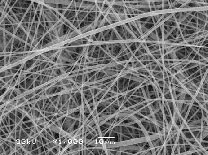Therapeutic Translation
Our core technologies in controlling cell behaviour and developing bioactive materials have the potential to treat or cure disease.
The development of products for clinical translation, based on genes, cells, tissues or organisms, requires an advanced understanding and utilisation of the regulatory and manufacturing landscape.
We interact and collaborate directly with key stakeholders in the UK and abroad, including research councils, charitable organizations and companies involved in commercialisation of research, along with the Medicines and Healthcare Products Regulatory Agency (MHRA) to identify and navigate key routes to clinical translation.
Electrospun polymer fibres

We are developing innovative BioFabrication processes to engineer materials and devices capable of communicating with biological structures at sub-cellular, cellular, and multi-cellular levels. By working at the interface between supramolecular chemistry, additive manufacturing, and medicine we are transforming breakthrough scientific discoveries into disruptive, yet predictable, technologies with societal impact. We are developing these approaches in collaboration with clinicians and industrial partners to create more efficient therapies for tissue regeneration and regenerative medicine.
Other projects, including novel peptide delivery systems and 3D printed functional materials, are at early stages of the translational pathway.
Our research is generating products, including electrospun scaffolds, extracellular matrix derived hydrogels and temperature-sensitive polymers that are being or have been protected intellectually and are currently undergoing product development.